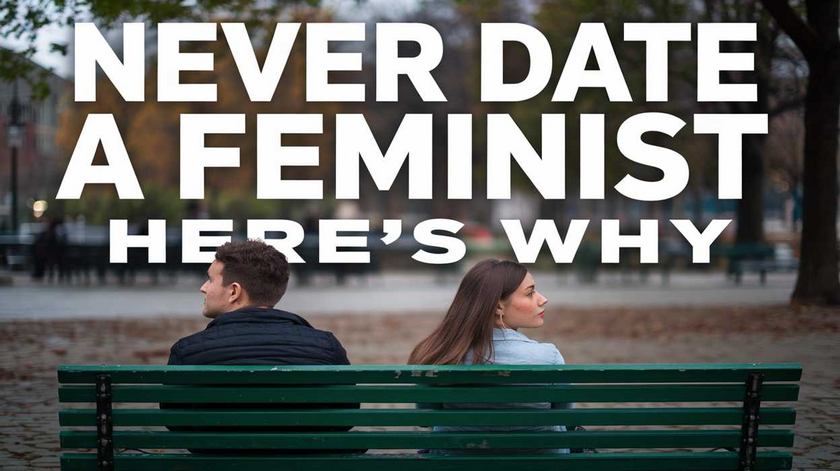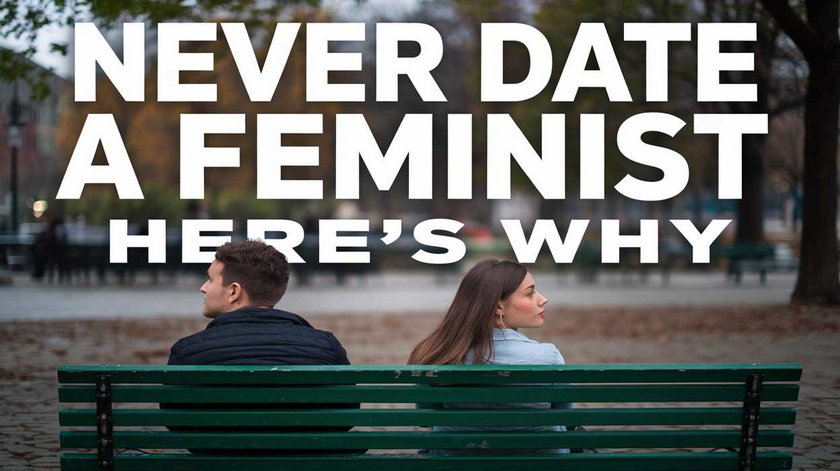
Never Date a Feminist: Here’s Why
Something precious has been lost between men and women. You can feel it in the awkwardness of modern dating, the cold negotiations of marriage, and the way so many couples approach each other with suspicion instead of trust. What used to be a natural partnership—rooted in complementarity and mutual respect—has been reframed through a political lens that sees power, not love, as the central dynamic.
That shift didn’t happen by chance. Feminist ideology, as it evolved from the 1960s onward, carried a moral story about men and women: that men were the oppressors and women their victims. What began as a call for fairness hardened into a worldview that mistrusts men, glorifies grievance, and turns intimacy into an ideological battlefield.
So when you date a feminist, you’re not just meeting a person—you’re often meeting a worldview that sees you as suspect before you’ve even opened your mouth.
1. The Collapse of Trust
No relationship can thrive without trust, yet feminism has steadily eroded it. When men are portrayed as potential abusers and women as perpetual victims, how can either side relax into genuine affection?
Young women today are taught to approach men as hazards—to “believe all women” and “trust no man.” The presumption of male guilt seeps into dating itself. A man’s simple gestures—holding a door, offering a compliment, expressing interest—are filtered through suspicion. Men, in turn, retreat into silence and self-protection. Many simply stop trying.
Intimacy dies when both sides are afraid of each other.
2. The Pathologizing of Masculinity
For decades, men have been told that something essential about them is wrong. Assertiveness, stoicism, competitiveness, and strength—the very traits that once formed the foundation of male contribution—are now branded “toxic.”
The tragedy is that these traits, rightly directed, make men reliable partners and protectors. A man who masters his aggression and channels his drive is the kind of man a woman can count on. Yet feminism teaches women to distrust those qualities and teaches men to suppress them.
Date a feminist, and you’ll often find yourself apologizing for being masculine at all. She’s been told to want a “strong man,” but only if he never acts like one.
3. From Partnership to Power Struggle
Love used to mean two people combining strengths to face the world together. Feminism recast that partnership as oppression. Marriage became a “patriarchal trap,” commitment a limitation, and dependence a weakness.
In the feminist frame, dating is a negotiation over power. Who pays? Who leads? Who compromises? Every act becomes a political calculation instead of a moment of grace.
But love cannot flourish in an atmosphere of scorekeeping. The best relationships aren’t 50/50 trades but 100/100 offerings—each giving their best without fear of exploitation. Feminism trains women to guard their independence and men to apologize for their strength. No wonder so many couples today feel like opponents instead of allies.
4. The Loss of Gratitude
Healthy love thrives on gratitude—the simple act of appreciating what the other brings. But when one gender is cast as the historical oppressor, gratitude becomes taboo.
Feminist teaching encourages women to expect rather than appreciate. Men are told that whatever they give—income, loyalty, protection—is merely payment on a debt. When giving becomes obligation, affection turns transactional.
That loss of gratitude leaves both sexes empty. Women feel perpetually unsatisfied, and men feel invisible. The dance of masculine offering and feminine appreciation has been replaced by mutual resentment.
5. The Devaluation of Marriage and Family
Feminism’s contempt for traditional roles has devastated family life. Marriage was recast as control, motherhood as limitation, and fatherhood as irrelevant.
A generation of women were told happiness lies in career success and sexual freedom, not in building a life with another person. Many believed it—only to find themselves lonely, overworked, and wondering where all the “good men” went.
Meanwhile, men were told they weren’t needed. Popular culture mocked fathers as fools, and courts treated them as visitors to their own children. The result: rising fatherlessness, falling marriage rates, and a generation of children growing up without stability.
Feminism calls dependence weakness. But love—real love—depends on mutual reliance. It’s not submission; it’s unity.
6. Shame and Fear in Intimacy
Dating used to carry a spark—flirtation, pursuit, playfulness. Feminism replaced it with fear. Men now hesitate to show desire lest it be called predatory; women second-guess their femininity lest it be called weakness.
Sex itself has been politicized. Every gesture is scrutinized through the lens of consent workshops and power analysis. Feminism promised liberation but delivered anxiety. Both sexes now overthink what used to come naturally.
If you date a feminist, don’t be surprised if attraction turns to debate. Ideology kills chemistry faster than rejection ever could.
7. The Weaponization of Blame
In today’s relationship culture, when something goes wrong, the narrative already knows who’s to blame—the man.
Whether the problem is emotional distance, poor communication, or conflict, men are told they must “do the work.” The female perspective is validated automatically; the male one is pathologized. Even therapy has absorbed this bias, treating men as problems to fix rather than people to understand.
Feminism’s “emotional labor” myth—claiming women bear all the relational burden—adds insult to injury. The quiet, reliable men who serve, provide, and protect are invisible to a worldview that only sees female effort.
Final Thought
Dating a feminist often means dating someone who has been taught to see you not as a partner but as an opponent. You can love her, but you’ll be fighting ghosts—the patriarchy, “toxic masculinity,” and every man who ever hurt her.
If you want a relationship built on trust, respect, and admiration, find a woman who believes in men, who sees differences as gifts, not threats.
Never date a feminist—not because you fear her strength, but because you value love too much to let ideology poison it.
Men Are Good.



















